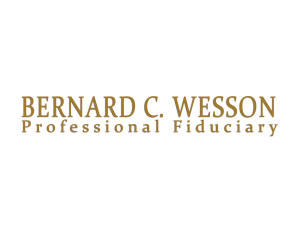
Mission
Based in Los Angeles, California, Mr. Wesson’s mission is to provide highly personalized fiduciary services with integrity and advocacy on behalf of all entrusted to his care. As a licensed and bondable professional fiduciary, he is available to manage the care and/or finances of another person or organization in private and court appointed matters. He offers free consultation to assess your needs and how he can be of service to you, your family, and your loved ones.
Experience
Based in Los Angeles, Mr. Wesson is a is fully licensed by California’s Professional Fiduciary Bureau. He offers highly personalized professional fiduciary services across a wide range of practice including Trustee (private, court appointed, corporate, charitable), Estate Executor/Administrator, Probate Administrator, Conservator of the Estate, Conservator of the Person, Attorney in Fact, Representative Payee, as well financial analysis for legal disputes. He holds a certificate in Professional Fiduciary Management – for Trustees and Conservators – from California State University, Fullerton, in addition to a BA degree with honors from Middlebury College in Vermont.
Mr. Wesson’s professional experience includes fourteen years as Partner/CFO for an independent business with annual sales of over $15MM. Duties included oversight of bookkeeping, leasing, payroll, project bidding, accounting, human resources, and legal affairs. Previously he was a partner in a private real estate lending company and has financial consulting and organization experience for family law and estate attorneys and their clients in preparation for court submissions and resolution conferences..
In these roles, Mr. Wesson has gained extensive experience in overseeing and managing a wide variety of assets classes including investments with wealth advisors and real estate, both commercial and residential.
Real world experience includes managing all personal and financial needs for a
disabled family member, giving Mr. Wesson great sensitivity to the special needs of the people he serves. In complicated family issues, Mr. Wesson can step in as a neutral and non-judgmental third party and help create a path to resolution or
manage affairs for family members who are having difficulties handling these issues on their own. In disputes before the court, Mr. Wesson can serve as a neutral to marshal and protect the assets until a legal resolution is reached.
AREAS OF PRACTICE
- Trustee (private and court appointed)
- Trust Administrator (private and court appointed)
- Estate Administrator (Probate)
- Conservator
- Agent Under Power of Attorney
- Guardian ad Litem
TRUSTEE:
Whether private or court appointed, the trustee is bound by the terms of the trust. The trustee must administer the trust and safeguard the assets by making prudent decisions regarding investments, real estate, and all other assets, while maintaining on open line of communication and reporting with the beneficiaries..
EXECUTOR/ESTATE ADMINISTRATOR: Named or nominated to carry out the terms of a will, including dispensing or disposing of assets, settling debts, paying creditors, and filing taxes.
SPECIAL NEEDS TRUST: Devised to serve the needs of a disabled person to enhance their lives over and above other government benefits they might be receiving. The trustee oversees and administers the assets placed in the trust for the person with disabilities.
CONSERVATOR OF THE ESTATE: Appointed by Probate Court, the COE is empowered to manage the financial affairs of someone deemed legally incapable of doing this for himself or herself. Responsibilities include marshaling all assets, prudent management of investments, real estate management, maintaining insurances and periodic accounting to the court that oversees the conservatorship.
CONSERVATOR OF THE PERSON: Appointed and overseen by Probate Court, the COP manages the living situation and medical care for a person deemed by the court to be mentally incapable of caring for themselves. The COP advocates on behalf of the conservatee seeking the least restrictive and safest living options and is often given the power to make medical and end of life decisions in keeping with the conservatee’s religious background and personal beliefs.
.

